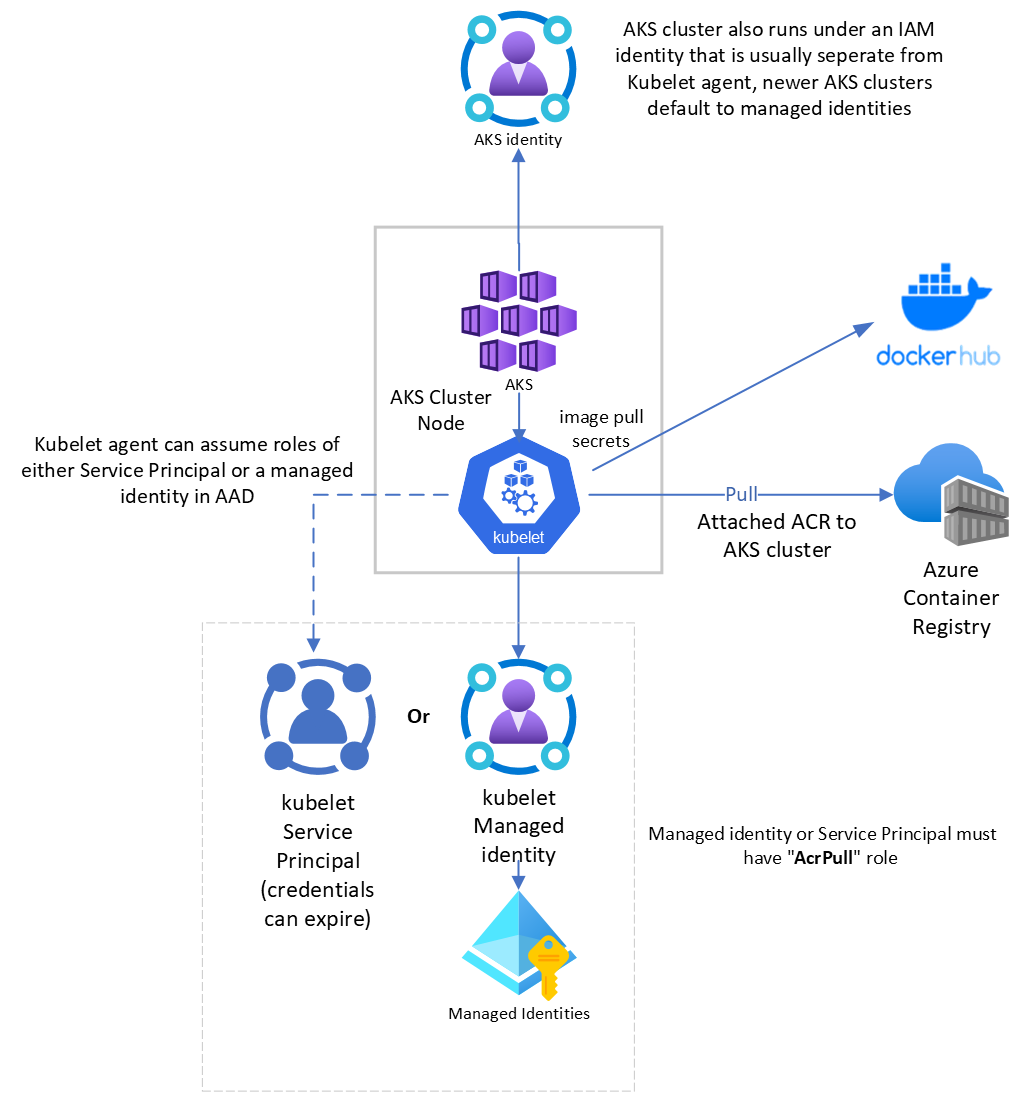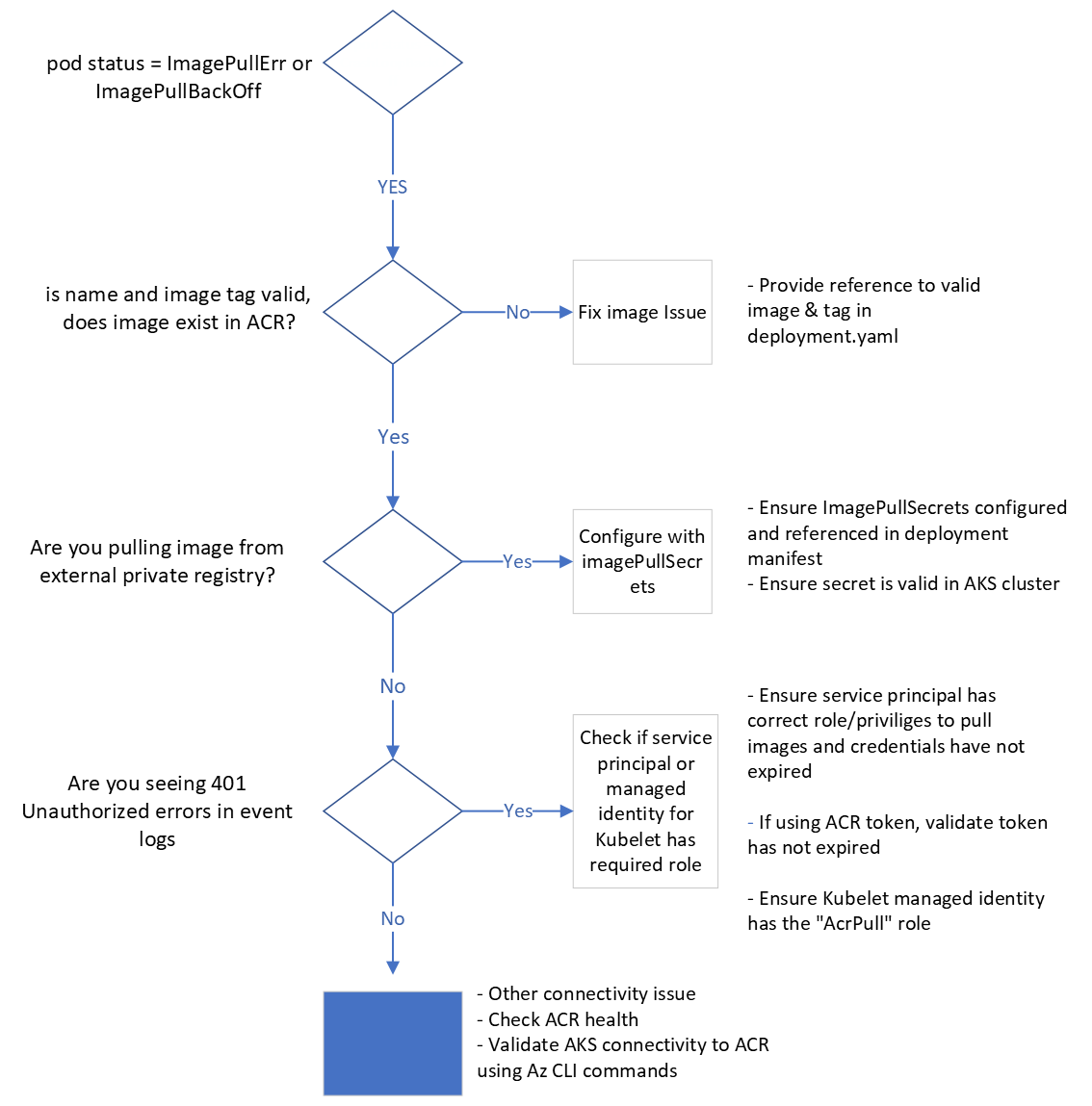Topic 2. Azure ACR Access/Authentication Issues with Azure AKS Cluster
Azure Container Registry (ACR) and Azure Kubernetes Service (AKS) integration could face various access/authentication issues, primarily due to misconfigurations, expired credentials, lack of permissions, or network restrictions. Below is a markdown list detailing these potential challenges:
Understanding AKS, ACR integration and Managed Identities
Newer AKS provisioned clusters use Azure AD Managed identities by default.

Common troubleshooting steps for ErrImagePull errors
The following is a simple flowchart/guide to help troubleshooting ErrImagePull & ErrImagePullBackOff errors for a deployed POD

- ACR and AKS Configuration:
- Misconfigurations: Incorrect configuration of ACR or AKS can prevent them from integrating successfully.
Sample 1 - Disconnected ACR Test an image pull from an ACR in the same subscription but disconnected from the AKS cluster
Use the following command to disconnect an ACR from an AKS cluster, please replace values of resource group and registry with your own subscription values.
az aks update -n ktb-aks -g k8s-tech-brief-rg --detach-acr akhanacrDeploy an application from the disconnected ACR
kubectl apply -f .\errimagepull\deployment-acr-not-connected.yaml kubectl describe pod shows an ErrImagePull error occurs with a HTTP 401 Unauthorized Error
kubectl describe pod shows an ErrImagePull error occurs with a HTTP 401 Unauthorized Error 
The following az cli command is very useful for checking and validating connection configuration between ACR and an AKS cluster and a rule should be used to test for missing roles and integrations.
az aks check-acr --name ktb-aks --resource-group k8s-tech-brief-rg --acr akhanacr
The following command can subsequently used to explicitly attach an ACR to an AKS cluster, note multiple ACR’s can be attached to a single AKS cluster.
az aks update -n <<AKS_CLUSTER_NAME>> -g <<RESOURCE_GRP_NAME>> --attach-acr <<ACR_ID>>- Incorrect Image References: Incorrect or non-existent image tags and references will lead to failures in pulling images from ACR. These errors can be generic and sometimes misleading.
Sample 2 - incorrect image Tag Test a deployment from a valid ACR but incorrect image tag for an application
kubectl apply -f .\errimagepull\deployment-acr-invalid-image.yaml
note: kubectl describe pod still shows the 401 Unauthorized error which is somewhat misleading in this case, pay attention to the RPC Error Code which shows NotFound

- Service Principal Issues:
- Expiration: Service Principals have an expiration date, post which they are unable to authenticate.
- Insufficient Permissions: If the Service Principal doesn’t have adequate permissions to access ACR, it will fail to pull images.
- Deletion or Disabling: Deleted or disabled Service Principals result in authentication failure.
- Managed Identity Issues:
- Scope of Assignment: Managed Identities may not have the correct scope of assignment, i.e., not assigned at the correct level (Subscription, Resource Group, Resource) to have access to the ACR.
- Role Assignment: Lack of or incorrect role assignment, such as lacking AcrPull (or higher) role, can prevent pulling images.
- Misconfigurations: Incorrectly configured managed identities can lead to access issues between ACR and AKS.
- RBAC Roles:
- Lack of Appropriate Roles: Not having appropriate roles assigned, like
AcrPullto pull images orAcrPushto push images, will result in access denial. - Role Assignment Level: Incorrect level of role assignment (Resource, Resource Group, Subscription) can also lead to issues.
- Multiple Roles Conflict: Having multiple conflicting roles assigned can cause unexpected behavior.
- Lack of Appropriate Roles: Not having appropriate roles assigned, like
Sample 3 - Missing Role This exercise Simulates an Access role issue by explicitly removing the AcrPull role from the Kubelet’s Managed Identity account. Note: for new AKS clusters, this is enabled/set when the ACR is associated to the AKS cluster.
az role assignment delete --assignee 617dcb03-43e1-435f-93ac-6fd109cc4a21 --role AcrPull --scope /subscriptions/ae5cd0d7-0de7-46fc-98ed-73428e2bdd5b/resourceGroups/k8s-tech-brief-rg/providers/Microsoft.ContainerRegistry/registries/akhanregistry
kubectl apply -f .\errimagepull\deployment-midentity-missing-role.yaml
- Observe the results by examining the POD’s description (Kubectl describe POD «pod_name»)

-
We observe the events in the POD description by doing a Kubectl describe command.The ErrImagePull error results in a 401 Unauthorized error message which is expected as the managed identity does not have the right ACR privileges.

- Network Policies and Firewalls:
- Network Restrictions: AKS and ACR may be in different networks or subnets with no access to each other.
- Firewall Rules: Strict firewall rules may block the traffic between AKS and ACR.
- Private Link Issues: Misconfigurations or issues with Private Link setup can prevent access to ACR.
- External Private Registries:
- Authentication Issues: Incorrect credentials, token expiry, or other authentication mechanisms can lead to failure in accessing external private registries.
- Network Accessibility: External registries might be unreachable due to network policies, firewalls, or other network-related issues.
- Permissions and Roles: External registries might require specific permissions or roles that, if not configured properly, can prevent access to the required resources.
Sample 4 - Private Registry The following deployment attempts to pull an image from a private Docker Hub registry
kubectl apply -f .\errimagepull\deployment-private-registry.yaml
The deployment fails with an ErrImagePull, we see the Access Denied.. Authorization failed error in the events when getting the POD description 
To resolve the issue, simply uncomment the imagePullSecrets section in the deployment.yaml and redeploy, the imagePullSecrets referenced has already been created in the AKS cluster.
containers:
- name: main
imagePullPolicy: Always
image: akhan2017/nginx
registry
imagePullSecrets:
- name: dockerhubcred
note: When dealing with external private registries, always ensure there is connectivity/outbound access to the external registry endpoint and an imagePullSecrets has been setup on the registry.
Recommended Practices
- Regularly review and renew Service Principals and Managed Identities.
- Assign minimum necessary permissions and regularly audit roles and permissions.
- Properly configure network policies, firewall rules, and Private Links.
- Regularly validate the configuration and access between AKS and ACR.
Remember that resolving access and authentication issues typically involves examining the Kubernetes events and logs, validating the configurations, permissions, and network connectivity, and addressing any identified discrepancies or issues.
Useful az cli commands to always start troubleshooting ACR auth issues
These commands validate you have connectivity to the container registry and the required roles have been assigned to the managed identity.
- az acr check-health –name
--ignore-errors --yes - az aks check-acr –resource-group
--name --acr <acrname/login server>
Useful Log Analytics (KQL) queries for ACR
If you have enabled Log Analytics and diagnostic logs for your Azure Container Registry, you can run queries to get detailed information on the frequency of login attempts etx
The following sample query will return container details by namespace for the last 4 hours for any containers that are in an ImagePullBackOff status.
KubePodInventory
| where ClusterName == "ktb-aks"
| where TimeGenerated > ago(4h)
| where ContainerStatusReason == "ImagePullBackOff"
| project Name, Namespace, ContainerStatusReason
The following sample query will return any 401 Unauthorized login attempts in the last 24 hrs.
ContainerRegistryLoginEvents
| where TimeGenerated > ago(1d)
| where ResultDescription contains "401"
| sort by TimeGenerated asc